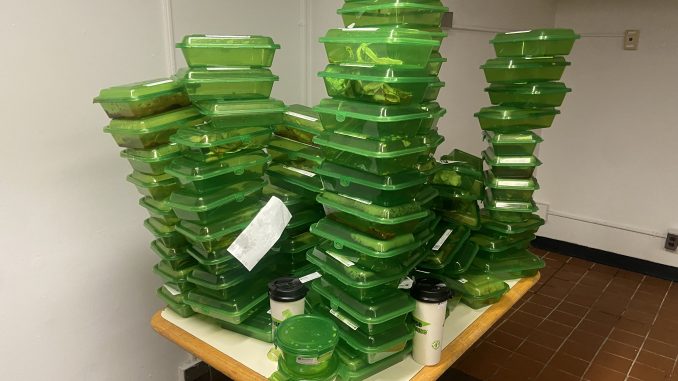
Starting this fall 2024 semester, SUNY New Paltz is changing their reusable container policy, swapping the disposable cardboard containers used in years prior for more eco-friendly, reusable plastic Ozzi containers, unless students choose to pay an additional $5 to eat out of the cardboard container.
This change in meal plating is the result of the SUNY Procedure 5200, which was declared on March 5, 2024 by SUNY Chancellor John B. King across all SUNY schools. The goal of the initiative is to eliminate the use of disposable products wherever possible. Through this initiative, the SUNY system will attempt to reduce waste and promote sustainability.
SUNY Procedure 5200 is being carried out at SUNY New Paltz by Campus Auxiliary Services (CAS), which is “an independent, not-for-profit organization that contracts with the college to provide food service, bookstore, vending, outdoor education, conference scheduling and many other services,” according to the CAS website. In order to effectively serve the campus community while committing to this goal of eliminating the use of disposable products, CAS has developed a system through the software ReusePass. The system allows students to place as many food orders as they’d like to at any time, as long as they return their Ozzi containers to one of the numerous collection sites when they are finished. Failure to return a container within the provided time frame of three days results in a $5 fine, holding students accountable to comply with the deadline and return their containers.
“It’s like a library card system,” explained Steven Deutsch, executive director of CAS at SUNY New Paltz. “You can take out as many books as you want, or as many containers as you want, but we now have this tracking system that attaches containers to you. Through that attachment, we know how quickly you’re returning them, and if things get lost.”
Although some have shared concerns about losing containers, return rates have been highly positive thus far into the semester. As of Sept. 5, the school reports that 10,541 containers have been checked out, with 8,960 having been returned – an 85% return rate. This rate is only expected to increase as students familiarize themselves with the system. This expectation is backed up by the inquiry rates for the first two weeks of the semester; 14% of student participants had inquiries about the system in the first school week, although this statistic dropped to 1% in the second.
Outside of concerns about return rates, a few other concerns with the container system have surfaced. The first of these concerns is the buildup of containers in public areas. In the first week of school, the main container collection site was in the hallway across from the bathrooms at the Student Union Building (SUB). The collection unit filled up very quickly, which led students to stack their containers on the ground nearby. However, the school has since moved the main collection site to the East Dining Room of the SUB and has increased the size of the collection unit. The problem has slowed, but containers are still being stacked on and around the machine when it becomes full. Deutsch also stated that CAS may potentially put collection sites “in non-dining areas like residence halls, so that people can just drop them off. ”
“We want to make it as easy as possible to comply,” Deutsch explained.
Another concern shared by many students is one regarding the experience of eating out of plastic containers, and whether these Ozzi containers are sanitary.
“A lot of people don’t like to eat out of plastic,” noted Deutsch. “They’re afraid of it, and they feel for some reason that the containers may be unsanitary or not cleaned well enough.”
However, he believes that this is a short term issue. “The containers are very durable. They’re built to withstand very high heats and very frigid temperatures, and we are in the process of making sure our dishwashing is really strong to support it,” he said. “We’re actually going to buy a brand new dishwashing machine for the SUB specifically to support these containers and their cleanliness.”
Despite these concerns, Deutsch feels confident in the school’s ability to overcome the challenges.
Although the new system has had a few hiccups, CAS is working to resolve them, and the importance of finding sustainable solutions is paramount. To this point, Deutsch noted that it will take some adjustment for students to feel comfortable with this system, but that this adjustment period is worth the benefit it will have on the environment.
“The big lesson here is that it should be a little hard. We’re changing a very convenient form of lifestyle that Americans live. We can eat whatever we want, in any way that we want, and we can throw the remains in the trash and it’ll get hauled off to a trash dump,” he explained. “We’re trying to change that dynamic, to have all of the individual users contribute to reducing waste. We’re at a higher education institute, and we’re hoping people start to learn to live a little more sustainably. It’s not as good as being able to throw away as much stuff as you want, but that’s kind of the point. It’s better for the planet in the long run.”
SUNY New Paltz’s moves towards sustainable dining will not end with these reusable containers. In the coming years, CAS hopes to find more eco-friendly substitutions for the disposable straws, lids and utensils that are currently in use. Through changes like this, the school hopes to reduce waste and promote the longevity of the planet.
